KEG: Post II
13. e4
Still declining to castle and ready to attack. As previously mentioned, and even though it did not occur in the actual game, in some variations White may want to swing his Rook over to the King-side via d3, so the text allows this possibility. It also prepares for an advance in the center and a displacement of Black Knight on f6. 13... f4
"?"--(Tournament Book)
13...Nd5 and 13...BxB were arguably better, but there was nothing seriously wrong with the text, the Tournament Book notwithstanding. As will be seen, the Tournament Book was often out-to-lunch in its analysis of this game. 14. e5
"!"--(Tournament Book)
Definitely part of von Scheve's plan. But 14. Nh4 looks better. 14... Nd5
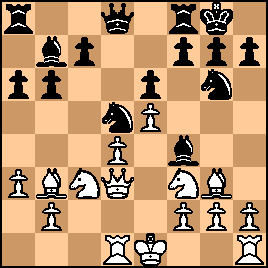
click for larger viewContrary to the Tournament Book, I see nothing all that awful with Black's position here. For what it's worth, Fritz and Stockfish rate the game as about even at this point. 15. Ne2
"!"--(Tournament Book).
In the long run, this move worked brilliantly for von Scheve (his final crushing move was 31. Nf4), but the move looks clumsy here. I prefer 15. Bc2 or 15. NxN or 15. h4 or 15. Ne4 to the text. The above being said, White is also OK at this point. 15... Bh6
Mason could also have just played 15...BxB with equality. 16. h4
Burning his bridges and by-passing his last real chance to castle. After 16. h4, the position was: 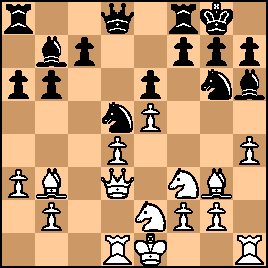
click for larger view16... Re8?
Though not commented on in the Tournament Book, this move was weak and could have spelled trouble for Mason. He would have been fine with 16...Qd7 or 16...Qe8. 17. h5!
All of a sudden, von Scheve has a dangerous King-side attack. 17... Nf8
He could alternatively have tried 17...Ngf4. In either case, Black faces a tough defensive effort to keep his head above water. 18. Bh4 Qd7
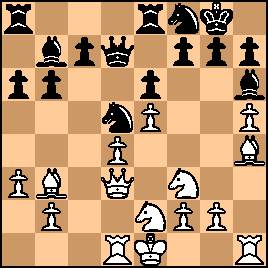
click for larger view19. Ng5?
An awkward effort. The better way to bring the f3 Knight into the attack was with 19. Nh2! This would also allow for the possibility of changing tack and deciding to castle. But von Scheve was apparently well-past considering such notions. 19... BxN
Here, as opposed to his decision on the next move, was the time to consider Ne7. But even after the text, Mason was not so bad---yet. 20. BxB
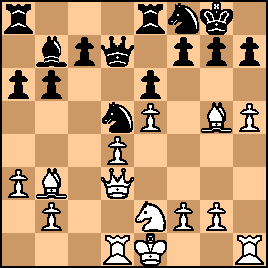
click for larger viewHaving played 19...BxN, it was now critical for Mason to protect against the advance of the White h-pawn with 20...h6. But, for the next several moves, both sides mysteriously discounted this possibility, until von Scheve finally took the plunge on his 23rd move. 20... Ne7?
What was a good defensive move on his 19th turn was now a potentially losing blunder, since von Scheve could now have played 21. h6! However: 21. Rg1?
21. h6, which again leaves open the chance for White to castle and which puts Black in an immediate crisis, was clearly best. 21... Kh8?
Black could and should have protected himself with 21...h6 Now, once again, von Scheve could have put Mason in grave danger with 22. h6. But: 22. Qh3?
This over-refinement again gave Mason a change to save himself with 22....h6, the position now being: 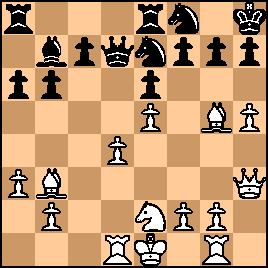
click for larger viewThis position gave Mason a final chance to save himself (with 22...h6). As will be discussed in my next post on this game, after Mason missed this final possibility, von Scheve ran him off the board. | 




